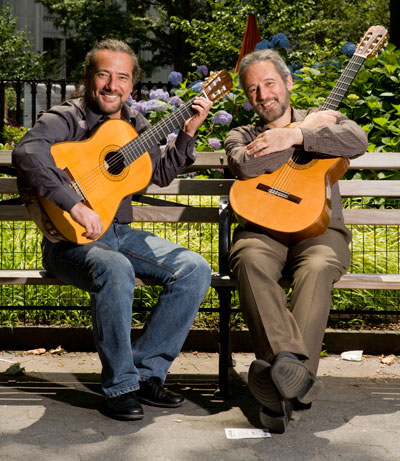Assad Brothers explore their Brazilian roots at Jordan Hall

The Assad Brothers performed a Brazilian program Friday night at Jordan Hall, presented by the Celebrity Series. Photo: Fadi Kheir
“We’ve played together forty-five years,” guitarist Sérgio Assad said from the stage of Jordan Hall Friday night. “This is the first time we’ve done a full Brazilian program.”
With an elegant mix of musical insight and the understated power of the classical guitar, Sérgio and Odair Assad presented an historical survey of the roots of their distinctive repertory.
A Celebrity Series presentation, the program sketched out the chôro influences from which the Assads draw their unique tunes, which include older brother Sérgio’s arrangements, his startling original compositions, and retooled works from other instrumental settings.
The first half of the program featured precursors of the classical style, composer/performers, most known by their nicknames, like Canhoto, Pernambuco and Garôto. After intermission, Sérgio’s own works were mixed in with more well-known composers like Villa-Lobos, Jobim and Gismonti.
The Assads are not the only guitar duo, of course. It’s an increasingly popular instrumentation, as a second guitar adds volume, and possibilities of harmonic and contrapuntal complexity. Which is exactly what distinguishes the Assads: Sérgio’s clever arrangements reinvigorate works, avoiding the “you play the bass and I’ll take the melody” gambit that pervades most rewriting.
Two works from Ernesto Nazareth began the evening: a waltz, Eponina, and a syncopated dance, Batuque. Odair Assad, the great virtuoso of the duo, played the primary melody in both, but at times it would subtly shift, with Sérgio fluidly relinquishing his rhythmic chores and sketching out a cantabile alternative.
Each work individually added to the colorful picture of the Brazilian national style, which, like most, is an amalgam of street music, native classical teaching and foreign flavors. Américio Jacomino (“Canhoto”), who, Jimi Hendrix-like, played the guitar upside down (“Canhoto” means “lefty”) and reportedly behind his head as well, wrote Abismo de Rosas, a benchmark for all accomplished Brazilian guitarists. In the hands of the Assads, pyrotechnics were avoided, its waltzing roots transformed into a subtle exchange of rich harmonies.
A medley from Anibal Augusto Sardinha (“Garôto”) showed Odair’s flair for de-tuning mid-song: for much of the evening he played in alternate tunings, but here he switched on the fly, to imitate music transcribed from the banjo, the ukulele or the mandolin.
The Assads’ sound is clean, with no stray accidentals and little mechanical sound from the left-hand changing pitch, a device favored by some guitarists. They rarely played percussively, although for Sérgio’s dynamic Tahhiyya li Ossoulina, an homage to the brothers’ Lebanese roots that gained a Latin Grammy award, they let loose, rapping alternately on the body, allowing the fingering to slide jazz-like over the strings, and dueling off the melody with improvisational flourishes.
Posted in Performances